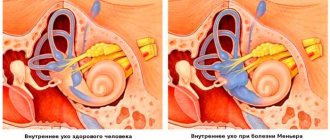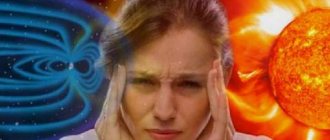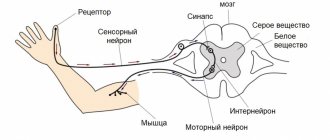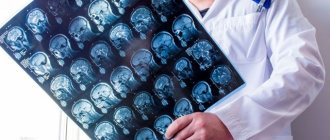Peculiarities
From the point of view of processes, within the body the movement of the ground from under the feet when changing the position of the body is due to an imbalance. It is achieved through reflexes of the musculoskeletal and vestibular apparatus, signals emanating from the organs of vision and touch, which, in turn, enter the brain.
Dizziness from changes in body position can be associated with lack of food, pathology of the cervical spine, disorders of the vestibular apparatus, cardiovascular diseases, chronic cerebral circulatory disorders, hypertension and other quite serious pathologies.
For a more accurate diagnosis, it is necessary to conduct an examination, based on the results of which a treatment plan will be developed.
The impulses processed by the hemispheres are returned to the muscles of the organs of movement, providing them with the necessary stability. Violation of these biochemical processes at any stage entails an illusory chaotic rotation of environmental objects around a person.
Early activation of a person and the use of vestibular gymnastics are important in restoring vestibular function.
The main point in therapeutic exercises is the coordinated movements of the eyeballs, head, torso, first performed while lying down, then sitting, standing and walking, which contributes to a speedy recovery due to the reconfiguration of the vestibular apparatus.When performing exercises, a prerequisite is the appearance of slight dizziness.
Neurologist
Pershina Natalia Sergeevna
8 years of experience
The symptom usually manifests itself precisely when changing position, especially in the case of sudden movements, since in a state of rest, impaired brain activity is not aggravated by changes in intracranial pressure and sudden inflows or outflow of blood.
Dizziness: the most common causes and forms
According to modern research, most often this disease is a symptom of diseases such as:
- BPPV (benign paroxysmal positional vertigo);
- basilar migraine;
- psychogenic dizziness;
- Meniere's disease;
- osteochondrosis of the cervical spine, as well as vertebrobasilar insufficiency;
- vestibular neuritis;
- brain tumors.
Note that BPPV accounts for more than 80% of cases of true dizziness. Below we will consider the main diseases that are accompanied by dizziness, and also describe the characteristics of dizziness in each case.
1. Benign paroxysmal positional vertigo is one of the most common forms of true vertigo. The name itself is deciphered as follows: “benign” means a favorable, harmless course of the disease, “paroxysmal” means the sudden onset of dizziness; “positional” - the appearance of dizziness when turning the head in a certain direction.
The reason for the development of BPPV is irritation of the receptors of the vestibular apparatus by otolith stones, which are located in the semicircular canals of the inner ear. This disease can also occur spontaneously in a person of any age, but in most cases it appears in people over 50-60 years old, after an injury or infection.
The main symptoms of benign positional vertigo are:
- the occurrence of severe dizziness when tilting or turning the head, when turning in bed, when throwing the head back;
- severe dizziness lasts from several seconds to several minutes, and it may be accompanied by weakness, severe nausea or vomiting;
- attacks of dizziness can appear in series, after which they disappear without a trace for some time.
Treatment of BPPV is carried out with a special exercise, and always under the supervision of a neurologist. Its duration is only 1-2 minutes, and its effectiveness reaches 90%.
2. Dizziness with migraine. Migraine is one of the most common types of headaches. In some cases, during a migraine attack, blood circulation is disrupted in the areas of the brain that control the functioning of the vestibular apparatus, which causes severe dizziness, after which a severe headache in the back of the head may immediately develop, imbalance may occur, vomiting, noise and light intolerance may occur. . Some people with migraines may only have severe dizziness and nausea, but no headache. In children, one of the precursors of migraines in adulthood are attacks of severe dizziness, imbalance, nausea, vomiting, which over time turn into typical migraine attacks.
3. Psychogenic dizziness ranks second in prevalence after BPPV. But unlike it, psychogenic dizziness is not true dizziness, since it is not associated with disturbances in the functioning of the vestibular apparatus.
The main characteristics of this disease:
- description of dizziness as a feeling of fog in the head, confusion, fear of falling and losing consciousness, but not as one’s own spinning or other objects;
- attacks of dizziness occur spontaneously, often under stress, in a confined space (transport, elevator), as well as in crowded places;
- in addition to dizziness, patients have other complaints that resemble some diseases of the internal organs: a lump in the throat, soreness, pain in the chest, abdomen or in the heart area, pain and tension in the muscles, a feeling of lack of air, a feeling of tension and internal fear, anxiety, irritability, anxious sleep, strong and unreasonable concern about one’s own health, as well as the health of loved ones, etc.
Psychogenic dizziness can also be considered one of the most common manifestations of VSD (vegetative-vascular dystonia). Particularly often, attacks of false dizziness can be observed in patients with anxiety disorders and panic attacks.
Determining the psychogenic nature of dizziness plays a big role in determining the correct treatment, so if you have an idea that dizziness in your case may be psychogenic, we recommend that you study information about vegetative-vascular dystonia, as well as its treatment.
In particular, with psychogenic dizziness, treatment that is intended for VSD (sedatives, psychotherapy) will be much more effective than specific drugs for dizziness, prescribed for all cases of true dizziness.
4. Dizziness with Meniere's disease. This disease is characterized by periodic attacks of severe dizziness and deafness (usually in one ear), gradually leading to hearing loss.
At the moment, the exact cause of Meniere's disease is still unknown. But there are suggestions that in some cases it may be caused by injury, viral infections or allergies.
A typical manifestation of Meniere's disease is an acute attack of severe dizziness, which lasts several hours or days and is accompanied by nausea, vomiting, tinnitus, hearing loss (in one ear) and a feeling of pressure inside the ear.
Typically, attacks of this disease appear one after another over several weeks, after which they disappear for some time, but then begin again.
5. Dizziness due to osteochondrosis, as well as vertebrobasilar insufficiency, neck and head injuries. As we have already said, the work of the human balance control system involves sensitive receptors of the muscles, bones, joints, ligaments of the whole body and mainly the muscles, bones and ligaments of the neck.
Degenerative diseases of the cervical spine, including osteochondrosis, are one of the most common causes of dizziness, which patients often describe as unsteady gait and rarely as a feeling of spinning.
Osteochondrosis of the spine disrupts the functioning of the sensory receptors in the neck, and can also cause disruption of blood circulation in the vertebral arteries, which supply blood to the parts of the brain responsible for balance and maintaining the body, located in the brain stem.
Chronic circulatory disorder in the lower parts of the brain (vertebrobasilar system) is called vertebrobasilar insufficiency. Atherosclerosis of the neck vessels and long-term hypertension (increased blood pressure) also play a certain role in its development. Most often, vertebrobasilar insufficiency occurs in older people. In addition to dizziness, it is accompanied by symptoms such as memory loss, headaches (mainly in the back of the head) and tinnitus.
Attacks of acute circulatory disorders in the vertebrobasilar region can manifest as severe dizziness, loss of consciousness, vomiting, weakness and double vision.
Injuries to the head and cervical spine (especially after car accidents) can also cause dizziness. In such cases, it is usually more pronounced in the first days after the injury and gradually decreases as the patient rehabilitates.
6. Dizziness with vestibular neuritis. This disease is an inflammation of the vestibular nerve, which carries impulses from the receptors of the inner ear to the brain. When the vestibular nerve becomes inflamed, it temporarily loses its ability to conduct impulses. This, in turn, is manifested by severe dizziness, unsteady gait, nausea and vomiting.
The main cause of vestibular neuritis is viral infections, so attacks of associated dizziness may be accompanied by weakness, fever, cough or runny nose.
7. Dizziness due to brain tumors. Some brain tumors that are located near the inner ear can cause severe and progressive dizziness.
Symptoms of a tumor, in addition to dizziness, may include the following phenomena:
- hearing loss (usually one ear);
- nausea;
- tinnitus, hearing loss;
- headache;
- the appearance of strabismus, paralysis of the facial muscles.
Dizziness as a symptom of a brain tumor is most often observed in young people and children.
Kinds
Depending on the causes of the syndrome, it is divided into several types. They can be most broadly divided into those typical for a healthy person and those associated either with a lack of any microelements that ensure normal brain activity, or with the development of another disease.
In the first case, the problem is caused by severe overloads and quickly goes away after the impact on the person stops. This can happen during and after carousel rides, dancing, or skydiving.
As a result of changes in pressure and blood flow and flow, the brain begins to process impulses more slowly. Because of this, the “picture” before the eyes begins to float, as the synchronicity of the work of the vestibular apparatus and the organs of vision is disrupted. This condition does not pose any health hazard and does not indicate any particular pathology.
Dizziness and nausea in the morning
Dizziness and nausea are natural physiological responses to mental and physical fatigue.
In the second case, dizziness is due to the fact that oxygen saturation of the brain is reduced, so it again begins to work at a slower pace. This happens for the following reasons:
- due to systematic malnutrition;
- due to insufficient rest;
- during pregnancy;
- in conditions growth ;
- due to stress, due to which the body gets tired much faster, and so on.
This condition is also usually harmless and goes away with rest and normal nutrition.
The worst thing is when loss of balance when changing body position is caused by a disease. In this case, be sure to consult a doctor in time and find out the causes of pathological disturbances in orientation in space.
Treatment
In order to get rid of dizziness and bouts of darkening in the eyes, it is necessary to establish the correct diagnosis. The doctor will then decide whether medication is needed. In many cases, to stabilize the condition, it is enough to change your lifestyle, diversify your diet, regulate physical activity and improve the quality of sleep.
Treatments using traditional medicine methods
In order to avoid attacks of darkening in the eyes, you can use the recipes offered by traditional healers: twice a day, 30 minutes before meals, drink 20 or 30 drops of lemongrass tincture; for 20 days, consume 5-20 drops of ginseng tincture 2 times a day. They increase blood pressure.
If your eyes get dark no more than twice a month, you can rest, balance your diet, walk in the fresh air, and it will pass. If you experience more frequent dizziness and episodes of darkening in your eyes, you should consult a doctor. Timely treatment is the key to success.
Sometimes people face such a problem that they feel dizzy when they get up from their place or bed. At the same time, it often becomes dark in the eyes and even nausea appears for a couple of seconds. Let's look at why this happens and whether it needs to be treated.
If you notice that when changing your body position from horizontal to vertical - standing up or simply straightening up - you feel dizzy, dark before your eyes, weak, begin to feel nauseous, sweating and a feeling of impending fainting, then most likely the problem is orthostatic hypotension.
It manifests itself in various somatic and neurological disorders and diseases. It is very common in vegetative-vascular dystonia - a violation of vascular tone. And this means that blood pressure decreases so sharply when changing body position that it can even drop to zero. Usually such attacks last 3-4 seconds, and if you faint at the same time, then up to 10 seconds.
These conditions often occur in adolescents due to insufficient blood flow to the brain. This is due to the fact that the vessels grow quickly, and the body does not have time to monitor their work. Therefore, for young people aged 13 to 20, this is normal. Especially if they have naturally low blood pressure.
Injuries to the spine and head that have occurred once may present with similar symptoms. And the point, again, is the malfunction of the vessels, which cannot sufficiently and at a sufficient speed provide the desired distribution of blood pressure.
Orthostatic hypotension can also indicate problems with the heart rhythm, when the heart does not pump out enough blood or forcefully. Or, on the contrary, the veins do not allow enough blood to pass to the heart. All this may be a consequence of a defect of the heart and its systems, a violation of its functional activity.
Another reason why you feel dizzy when standing up suddenly may be diseases and disorders of the inner ear. The liquid in its cavity helps us determine the position of the body in space. But when the ear is damaged, inflamed, the amount of fluid increases, and the blood flow becomes abnormal. In this case, with dizziness, pain, a feeling of fullness, congestion, ringing, and noise in the ear are sometimes noted.
In older people, dizziness when standing up may occur as one of the symptoms of atherosclerosis. Here the head will not only feel dizzy, but also hurt, memory will be impaired, thinking will deteriorate and many other symptoms will be present.
Causes
Since dizziness can result from a large number of factors, and such a symptom will disappear almost immediately, it is worth dwelling in more detail only on those reasons that lead to a stable condition that affects the patient’s quality of life.
Why can our articles be trusted?
We make health information clear, accessible and relevant.
- All articles are checked by practicing doctors.
- We take scientific literature and the latest research as a basis.
- We publish detailed articles that answer all questions.
Of the first group of minor factors, it is worth noting only the influence of otoliths - small irritants formed in the area of the middle ear, where the vestibular apparatus is concentrated in a person. They affect the receptors responsible for the sense of balance.
Because of this, a person may sometimes have a slight feeling that his head is spinning while moving and especially during a sharp jerk. Most often, elderly people are susceptible to this syndrome.
Causes of more serious violations include the following:
- Osteochondrosis in the area of the cervical spine, due to which the head may feel dizzy when getting out of bed and immediately after taking a lying position.
- A problem with the vestibular apparatus, which very often accompanies a person with low blood pressure syndrome, manifesting itself especially strongly during a change in body position.
- Severe increase in blood pressure during hypertensive crises.
- Neuritis in the area of the vestibular apparatus and other inflammatory processes that compress the nerve endings of the middle ear, causing coordination in space to be impaired.
- disease , in which the inner ear fills excessively with fluid. Moisture puts pressure on the receptors responsible for balance.
- disease and progressive sclerosis provoke symptoms during movement.
- A complex of diseases of the heart and circulatory system: heart disease, anemia, coronary disease, heart failure, and so on.
- Chronic cerebral ischemia
Sometimes it can be difficult to determine the reason why you feel dizzy. Therefore, you should be attentive to your health and try to identify symptoms associated with dizziness.
Symptoms accompanying dizziness
Usually, if you feel dizzy after overload or due to prolonged rotation, this is not accompanied by any additional factors. However, in the case of pathology, such symptoms occur. Most often these include:
- trembling in the limbs;
- the appearance of strange glares and flashes before the eyes;
- general fatigue, lethargy and drowsiness;
- increased heart ;
- problems with hearing and smell;
- rapid breathing rate;
- severe sensitivity to smell.
The persistent manifestation of each of these symptoms may indicate the development of a serious illness, the treatment of which requires medical attention.
Diagnostics
Typically, patients with such complaints are sent for a series of diagnostic procedures. A comprehensive examination is often carried out to determine the exact reasons why a person is dizzy.
Doctors do the following tests:
- MRI of the head;
- duplex scanning of blood vessels;
- X-ray examination of the vertebrae in the neck;
- Ultrasound of the thyroid gland;
- Cardiographic examination.
Dizziness when tilting your head
The head and neck perform functions such as supporting the functioning of the brain, sensory organs and blood vessels.
As a result of these comprehensive studies, the pathologies that cause the syndrome are identified in the patient.
If the tests do not reveal any pathology, but frequent symptoms of loss of balance continue to bother the patient, then a test is performed to check for disruption of the vestibular apparatus due to crystalline growths in the middle ear. This work is carried out using the Dix-Hallpike method and implies the following:
- the patient sits on the sofa and turns his head to the left 45 degrees;
- then, without changing the position of his head, he abruptly lies on his back;
- then the procedure is repeated, but with the head tilted in the other direction;
- The syndrome is diagnosed if a person begins to feel dizzy during sudden movements.
Thus, the true causes of the condition in which a person begins to feel dizzy can only be determined through a comprehensive examination. And it should be carried out in a medical center under the supervision of qualified specialists.
First aid rules during an attack
If the manifestation of an attack, when surrounding objects begin to move around, is not associated with any serious pathology, this symptom can be relieved even at home:
- Having felt the first signs, you should calm down and try to lie down on the bed with slow, smooth movements, the number of which should be minimal. Then, after a few minutes, rise carefully as well.
- To prevent relapses of this problem, rest more often, spend more time in nature, and avoid stress and overwork.
- Including iron-rich foods in your diet may help.
- No less useful is a diet based on pomegranate, carrot and beet juices, which strengthen the walls of blood vessels and increase their elasticity.
Causes of tinnitus and dizziness
Tinnitus and dizziness can last from a second to several hours.
If a person is overtaken by a deterioration in his condition at work, on the street or anywhere else, he can use a proven remedy. A quick result is achieved by special therapeutic exercises, which include the following exercises:
- you should stop looking at any thing, without looking away until the discomfort when moving completely disappears;
- squeeze the area in the middle of the forehead and massage it for 20 seconds;
- do self-massage of the face, cervical spine, head area;
- combine exercises with restoring breathing through deep inhalations and exhalations at a slow pace.
In a situation where your head begins to feel dizzy, you should immediately consult a doctor. This condition can only be treated with medication.
Cases when you should consult a doctor immediately
You should consult a doctor as soon as possible in cases where dizziness is accompanied by the following symptoms:
- increased body temperature;
- persistent vomiting;
- severe headache, weakness of arm or leg muscles;
- severe dizziness lasts more than an hour;
- during an attack of dizziness the person lost consciousness;
- when dizzy, the patient fell and was seriously injured;
- A patient with diabetes mellitus and hypertension developed severe dizziness.









